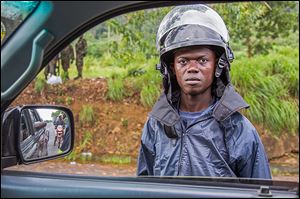
2 confirmed dead from Ebola in Congo
Cases not tied to outbreak; Briton evacuated
8/24/2014
A Sierra Leonean policeman stands at a road block as move-ment on roads is being controlled by the govern-ment.
KINSHASA, Congo — Two Ebola-related deaths have been confirmed in Congo, the country’s health minister said Sunday, though local officials believe the cases are unrelated to the outbreak in West Africa that has killed more than 1,400 people.
Eight samples were taken from Djera, located in the Congo’s northwest Equateur province, and two of them were positive, Felix Kabange Numbi said on state television Sunday.
Congolese officials believe Ebola has killed 13 people in the region, including five health workers, Mr. Kabange said.
He said 11 people were sick and isolated and that 80 contacts were being traced.
“This epidemic has nothing to do with the one in West Africa,” Mr. Kabange said.
This is the seventh outbreak of Ebola in Congo. The disease was first discovered there in 1976.
“The experience acquired during the six previous epidemics of Ebola will contribute to the containing of this illness,” he said.
In Sierra Leone, the first British citizen confirmed to be infected with Ebola is being evacuated on a jet sent by the Royal Air Force, officials said Sunday.
The World Health Organization also is considering medical evacuation for a Senegalese health worker who has become infected in Sierra Leone, the U.N. health agency said.
The British patient was working at an Ebola treatment center in eastern Sierra Leone, the region most affected by the outbreak, said Sidie Yayah Tunis, director of communications for the Sierra Leone health ministry.
The Senegalese health worker is an epidemiologist deployed from a WHO partner organization, WHO spokesman Gregory Hartl said on Twitter.
The two cases highlight the risks facing health workers in the battle against Ebola, which has killed more than 1,400 people across West Africa, according to WHO.